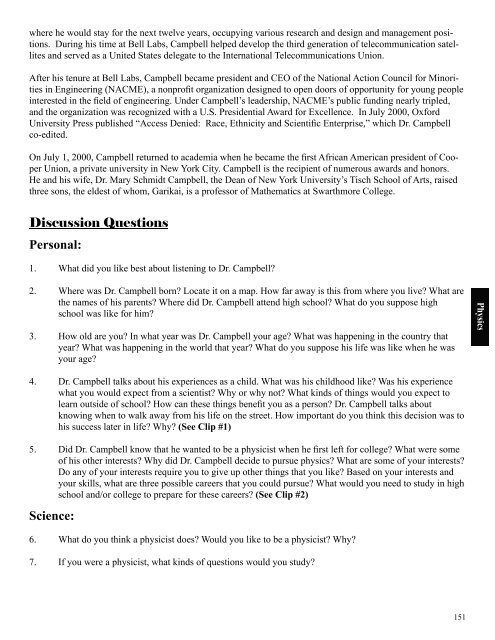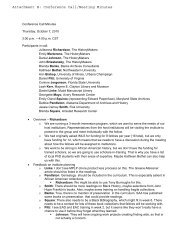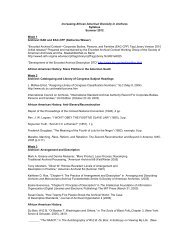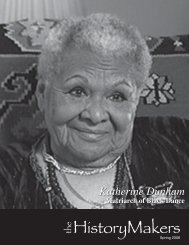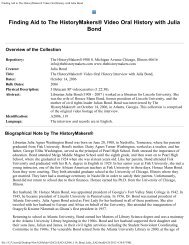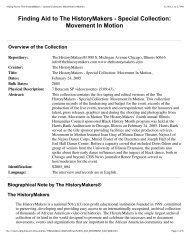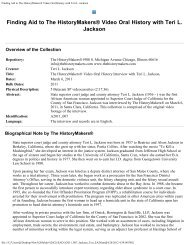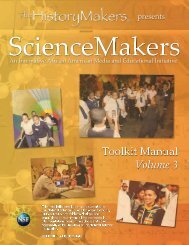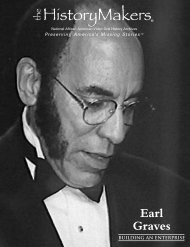ScienceMakers Toolkit Manual - The History Makers
ScienceMakers Toolkit Manual - The History Makers
ScienceMakers Toolkit Manual - The History Makers
You also want an ePaper? Increase the reach of your titles
YUMPU automatically turns print PDFs into web optimized ePapers that Google loves.
where he would stay for the next twelve years, occupying various research and design and management positions.<br />
During his time at Bell Labs, Campbell helped develop the third generation of telecommunication satellites<br />
and served as a United States delegate to the International Telecommunications Union.<br />
After his tenure at Bell Labs, Campbell became president and CEO of the National Action Council for Minorities<br />
in Engineering (NACME), a nonprofi t organization designed to open doors of opportunity for young people<br />
interested in the fi eld of engineering. Under Campbell’s leadership, NACME’s public funding nearly tripled,<br />
and the organization was recognized with a U.S. Presidential Award for Excellence. In July 2000, Oxford<br />
University Press published “Access Denied: Race, Ethnicity and Scientifi c Enterprise,” which Dr. Campbell<br />
co-edited.<br />
On July 1, 2000, Campbell returned to academia when he became the fi rst African American president of Cooper<br />
Union, a private university in New York City. Campbell is the recipient of numerous awards and honors.<br />
He and his wife, Dr. Mary Schmidt Campbell, the Dean of New York University’s Tisch School of Arts, raised<br />
three sons, the eldest of whom, Garikai, is a professor of Mathematics at Swarthmore College.<br />
Discussion Questions<br />
Personal:<br />
1. What did you like best about listening to Dr. Campbell?<br />
2. Where was Dr. Campbell born? Locate it on a map. How far away is this from where you live? What are<br />
the names of his parents? Where did Dr. Campbell attend high school? What do you suppose high<br />
school was like for him?<br />
3. How old are you? In what year was Dr. Campbell your age? What was happening in the country that<br />
year? What was happening in the world that year? What do you suppose his life was like when he was<br />
your age?<br />
4. Dr. Campbell talks about his experiences as a child. What was his childhood like? Was his experience<br />
what you would expect from a scientist? Why or why not? What kinds of things would you expect to<br />
learn outside of school? How can these things benefi t you as a person? Dr. Campbell talks about<br />
knowing when to walk away from his life on the street. How important do you think this decision was to<br />
his success later in life? Why? (See Clip #1)<br />
5. Did Dr. Campbell know that he wanted to be a physicist when he fi rst left for college? What were some<br />
of his other interests? Why did Dr. Campbell decide to pursue physics? What are some of your interests?<br />
Do any of your interests require you to give up other things that you like? Based on your interests and<br />
your skills, what are three possible careers that you could pursue? What would you need to study in high<br />
school and/or college to prepare for these careers? (See Clip #2)<br />
Science:<br />
6. What do you think a physicist does? Would you like to be a physicist? Why?<br />
7. If you were a physicist, what kinds of questions would you study?<br />
151<br />
Physics


